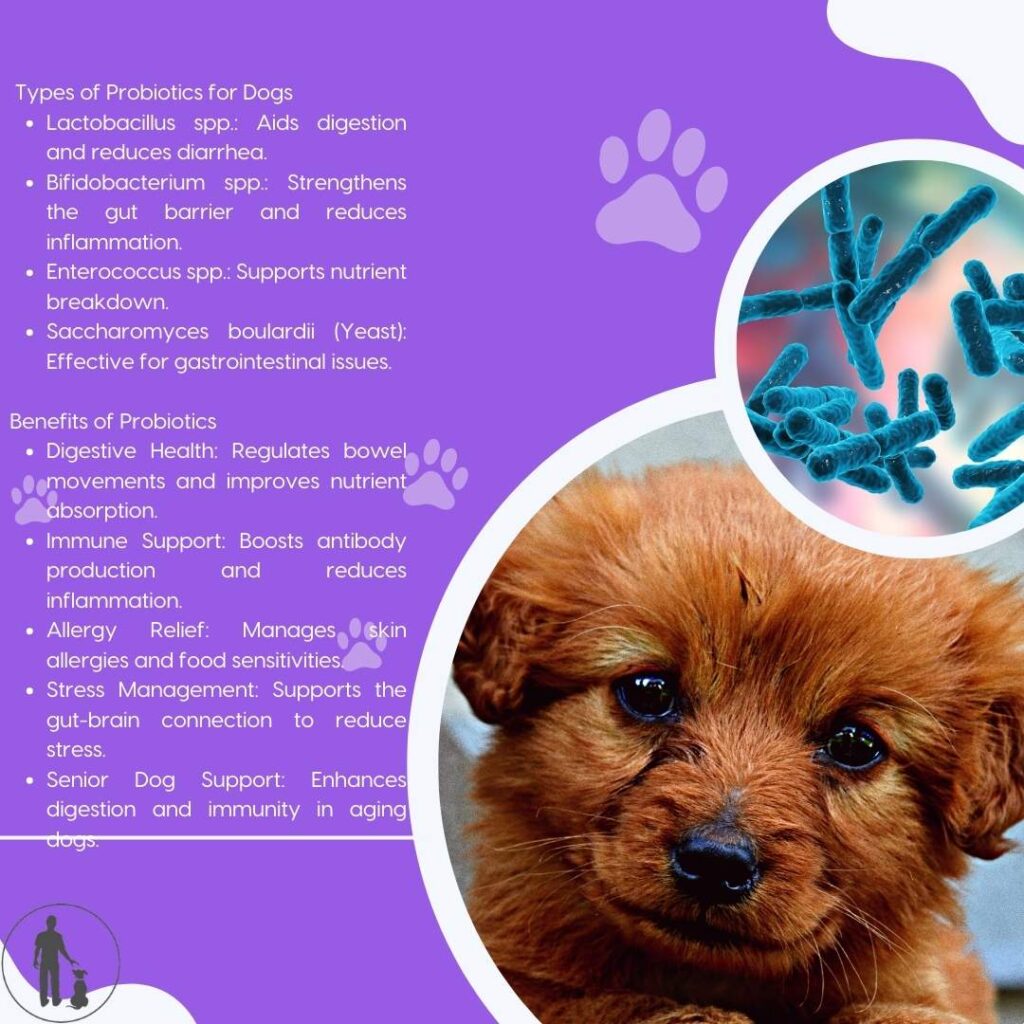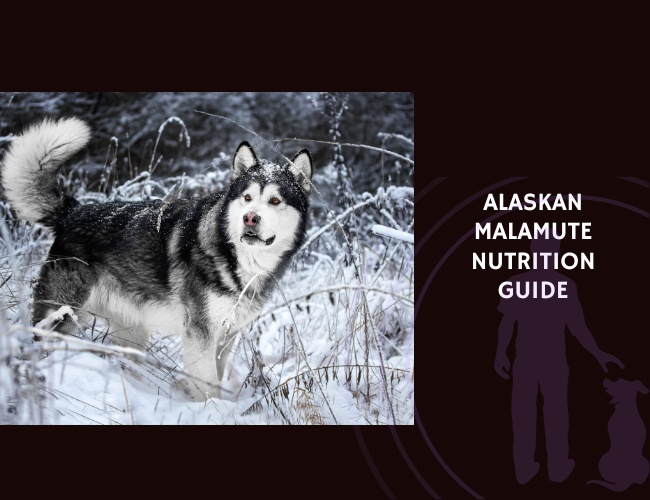Introduction to Probiotics in Canine Health
Definition of Probiotics and Their Role in Canine Gut Health
Probiotics are live microorganisms that, when administered in adequate amounts, confer health benefits to the host. For dogs, probiotics are pivotal to maintaining a balanced gut microbiome. This microbiome is a complex network of bacteria, fungi, and other microorganisms residing in the digestive system, and its equilibrium is crucial for good health.
When you introduce probiotics into your dog’s diet, these beneficial microbes colonize the gut, enhancing digestive processes and supporting overall well-being. Probiotics help break down food more effectively, improve nutrient absorption, and fend off harmful pathogens. Essentially, they are the unsung heroes that keep your dog’s digestive system running smoothly and efficiently.
Importance of Balanced Gut Microbiome for Overall Dog Health
A balanced gut microbiome is essential for your dog’s overall health. This balance affects several bodily functions, from digestion to immune response. A healthy gut microbiome can help your dog stave off illnesses, reduce inflammation, and even improve mood and behavior through the gut-brain axis.
When the gut microbiome is imbalanced, it can lead to a myriad of health problems such as diarrhea, constipation, and even chronic conditions like Inflammatory Bowel Disease (IBD). Maintaining this balance through the use of probiotics can prevent these issues and promote long-term health.
Key Types of Beneficial Bacteria Found in Canine Probiotics
Several key types of beneficial bacteria are commonly found in canine probiotics, each offering unique health advantages:
- Lactobacillus Species: These bacteria primarily aid in digestion and can help reduce diarrhea. A notable example is Lactobacillus acidophilus, frequently used in canine probiotic products for its proven digestive benefits.
- Bifidobacterium Species: Known for enhancing gut barrier function and reducing inflammation, Bifidobacterium animalis supports overall gut health and plays a vital role in maintaining a healthy gut environment.
- Enterococcus Species: These bacteria assist in breaking down nutrients and supporting gut health. Their presence ensures a balanced and functioning digestive system.
- Saccharomyces Boulardii: This yeast-like probiotic is particularly effective against gastrointestinal infections and diarrhea, making it a valuable addition to canine diets for managing digestive health issues.
Probiotics are not just a fad; they are a fundamental component of canine health management. Understanding and incorporating the right probiotics can make a significant difference in your dog’s overall health and quality of life. By focusing on maintaining a balanced gut microbiome, you are supporting not only your dog’s digestive health but also their immune function and well-being.
Next, we will explore the specific common probiotic strains for dogs, highlighting their individual benefits and roles.
Common Probiotic Strains for Dogs
Lactobacillus Species and Their Digestive Benefits
Lactobacillus species are among the most commonly used probiotics for dogs. One of the most notable strains within this group is Lactobacillus acidophilus. These bacteria are known for their ability to aid digestion by producing lactic acid, which helps maintain a slightly acidic environment in the gut. This acidity is crucial for inhibiting the growth of harmful bacteria and ensuring smooth digestive processes. Additionally, these bacteria can help reduce instances of diarrhea, making them an invaluable component of canine probiotic formulations.
Bifidobacterium Species and Their Role in Gut Barrier Function
Bifidobacterium species are another essential group of probiotics for dogs. A prominent strain in this category is Bifidobacterium animalis. These bacteria primarily support gut health by enhancing gut barrier function. By adhering to the gut lining, Bifidobacterium species can strengthen the gut’s protective barrier, preventing harmful pathogens from entering the bloodstream. Moreover, they help reduce inflammation, promoting a healthier and less irritable gut environment.
Saccharomyces Boulardii and Its Effectiveness Against Gastrointestinal Infections
Saccharomyces boulardii is a unique probiotic yeast known for its effectiveness in combating gastrointestinal infections. Unlike bacterial probiotics, this yeast remains active and can quickly colonize the gut, offering a fast-acting solution to digestive disturbances. Saccharomyces boulardii is particularly effective against diarrhea and gastrointestinal infections, making it a valuable addition to a dog’s diet during periods of digestive distress.
Understanding these key probiotic strains and their specific benefits can equip dog owners with the knowledge needed to make informed decisions regarding their pet’s gut health. By introducing these beneficial bacteria into your dog’s diet, you can support their digestive efficiency, reinforce gut defenses, and enhance overall well-being.
Next, we will explore the multitude of health benefits associated with probiotic supplementation, highlighting how these tiny microorganisms can make a big difference in your dog’s health journey.
Health Benefits of Probiotics
Probiotics offer a range of health advantages for dogs, primarily by supporting digestive health, enhancing immune function, reducing antibiotic-associated diarrhea, and improving nutrient absorption and metabolism. Understanding these benefits can help you make informed decisions regarding the dietary needs of your canine companion.
Improvement in Digestive Health and Immune Function
Probiotics are essential for maintaining a balanced gut microbiome, which plays a critical role in your dog’s digestive efficiency. By regulating bowel movements, probiotics can prevent both diarrhea and constipation, particularly in dogs suffering from gastrointestinal disorders such as irritable bowel syndrome (IBS) and colitis.
Additionally, probiotics can enhance your dog’s immune function. By stimulating the production of antibodies, they help the immune system combat infections and reduce inflammation. Probiotic strains such as Lactobacillus and Bifidobacterium contribute to maintaining a robust immune response, ensuring your dog remains healthy and active.
Reduction in Antibiotic-Associated Diarrhea and Inflammation
Antibiotic treatments can disturb the natural balance of gut flora, often leading to diarrhea. Probiotics can help restore this balance by replenishing beneficial bacteria, thereby preventing or reducing antibiotic-associated diarrhea. This process not only minimizes discomfort but also expedites recovery, allowing your dog to return to optimal health more swiftly.
Moreover, probiotics can significantly reduce inflammation in the gut, which is beneficial for dogs with inflammatory bowel disease (IBD) or other gastrointestinal issues. By reinforcing the gut barrier and modulating immune responses, probiotics like Bifidobacterium animalis reduce inflammation and improve overall gut health.
Enhancement of Nutrient Absorption and Metabolism
A healthy gut microbiome supported by probiotics is crucial for effective nutrient breakdown and absorption. Probiotics enhance the digestive process, ensuring that your dog efficiently absorbs the essential nutrients required for energy, growth, and overall well-being.
Probiotics also impact metabolism. A balanced microbiome aids in managing weight by supporting healthy metabolic functions. This is particularly important for preventing obesity, a common concern in the canine population.
Probiotics can also help senior dogs sustain microbiome diversity, assisting in better digestion and immune function, thus ensuring that older dogs maintain their vitality.
By improving digestive health, reducing inflammation, and enhancing nutrient absorption, probiotics provide a solid foundation for your dog’s overall well-being. Up next, we will explore the specific health conditions where probiotics can have a targeted impact, further illustrating their essential role in canine health management.
Specific Health Conditions and Probiotic Applications
Management of Gastrointestinal Disorders
Managing gastrointestinal disorders in dogs, such as inflammatory bowel disease (IBD) and chronic diarrhea, can be challenging. Probiotics, with their beneficial live microorganisms, offer a supportive approach to these conditions. Strains like Lactobacillus and Bifidobacterium play a crucial role in this process. For example, Bifidobacterium animalis is known to enhance gut barrier function and reduce inflammation, making it particularly useful for gut health.
Probiotics help restore a healthy balance of gut bacteria, aiding digestion and reducing symptoms of gastrointestinal distress. Studies have shown that probiotic treatment can lead to faster recovery and fewer symptoms in dogs suffering from diarrhea. This balanced gut microbiome is vital as it directly influences the dog’s ability to absorb nutrients and maintain overall gut health.
Role in Stress Reduction and Anxiety Management
The gut-brain axis is a connection between the digestive tract and the brain, suggesting that probiotics can influence mental health. This relationship is gaining attention for its potential to reduce stress-related behaviors in dogs. When a dog’s gut microbiota is healthy and balanced, it can positively impact their mood and behavior. Probiotic strains like Lactobacillus and Bifidobacterium have shown promise in this area.
Studies indicate that probiotics can reduce anxiety and stress in dogs by regulating their gut microbiome. Given that stress can lead to gastrointestinal disturbances, the use of probiotics serves dual benefits – improving gut health and managing stress-related symptoms. Thus, probiotics can be a valuable part of managing behavioral issues.
Impact on Skin Health and Weight Management
Probiotics also contribute to improved skin health and weight management in dogs. Chronic skin conditions such as allergies and dermatitis can benefit from probiotic supplementation, which reduces inflammation and enhances skin health.
For weight management, a balanced gut microbiome supports metabolism. Probiotic strains like Lactobacillus and Bifidobacterium influence how food is digested and absorbed, contributing to healthier weight management in dogs. A healthy gut microbiome can prevent the onset of obesity by ensuring efficient metabolism.
These benefits form part of a comprehensive approach to managing your dog’s overall health. From digestive support to stress management and skin health, probiotics can play an integral role. Each strain offers distinct advantages, making them essential in a well-rounded canine care plan.
Transitioning now, think about the diverse ways in which probiotics can be sourced and administered to your dog, ranging from supplements to natural dietary inclusions.

Sources and Administration
Probiotics can be a great addition to your dog’s diet to help improve their gut health and overall well-being. Understanding the various sources and the best ways to administer these beneficial bacteria will ensure that your pup gets the full range of benefits. Let’s explore the different ways you can integrate probiotics into your dog’s daily routine.
Commercial Supplements
Commercial supplements are one of the most straightforward ways to provide your dog with probiotics. These supplements come in a variety of forms, including powders, capsules, and chewables, making them easy to integrate into your dog’s feeding routine. Some popular products include FortiFlora, Proviable, and VetriScience Probiotic, all of which are designed to offer specific strains of bacteria beneficial for canine health.
When choosing a commercial supplement, it’s important to look for products with high colony-forming units (CFUs). Most probiotic supplements provide between 1-10 billion CFUs per serving, which is suitable for most dogs. Additionally, ensure the products are certified for their efficacy and purity, such as those bearing the NASC Seal of Quality.
Probiotic-Enhanced Foods and Natural Sources
Some dog food brands now offer probiotic-enhanced formulas, which can simplify the process of ensuring your dog gets a daily dose of these beneficial organisms. These dog foods are fortified with specific strains of probiotics, making it convenient to support your dog’s digestive health.
Natural sources of probiotics can be incorporated into your dog’s diet as well. Plain yogurt (unsweetened and additive-free) and fermented vegetables like sauerkraut can serve as excellent sources of probiotics. Remember to introduce these natural sources gradually to monitor for any signs of intolerance or adverse reactions.
Guidelines for Proper Introduction and Dosage
Introducing probiotics to your dog’s diet should be done gradually to minimize any potential digestive upset. Here are some guidelines to consider:
- Start Gradually: Begin with small amounts of probiotic supplements or natural sources to observe how your dog reacts. Although some dogs may experience mild side effects initially, these usually subside as their digestive system adjusts.
- Consistency is Key: For probiotics to be effective, they should be administered consistently. Regular supplementation ensures that beneficial bacteria can colonize the gut and provide ongoing health benefits.
- Consult Your Veterinarian: It is always wise to consult with your vet before starting any new supplement regimen. Your veterinarian can help determine the right probiotic strain and dosage based on your dog’s unique needs and health conditions.
- Monitor Results: Keep an eye on your dog’s stool quality, coat condition, and overall energy levels. Improvements in these areas are good indicators that the probiotics are working effectively.
Probiotics can be a valuable addition to your dog’s overall health management plan, but they work best when integrated thoughtfully and consistently. With the right approach, you can help ensure that your dog’s gut health and overall well-being are maintained at their best.
Choosing the Right Probiotics
When it comes to picking the best probiotic for your dog, there are a few key areas to consider. Knowing what to look for can ensure you make the best choice for your canine companion’s health.
Species-Specific Strains and CFU Counts
One of the most important factors is selecting species-specific strains. Some probiotics are formulated specifically for dogs, ensuring they provide the intended health benefits. Look for products that include strains such as Lactobacillus acidophilus and Bifidobacterium animalis, as these are commonly associated with positive digestive and immune system support in dogs.
Another critical aspect is the Colony-Forming Units (CFUs). CFUs indicate the number of viable bacteria per serving. Ideally, you want a product with 1-10 billion CFUs per serving to ensure adequate potency. Products within this range have been shown to be effective for most dogs.
Storage Requirements and Product Certification
Once you’ve found a product with the right strains and CFU count, it’s essential to consider storage requirements. Some probiotics need to be refrigerated to maintain their potency. Always follow the storage instructions on the packaging to ensure the live bacteria remain effective.
Additionally, look for certifications that guarantee the quality and safety of the product. Products with the NASC Seal of Quality have been tested for purity and efficacy, providing additional peace of mind that you’re giving your dog a reliable supplement.
Consultation with Veterinarians
Before introducing any new supplement, it’s crucial to consult with your veterinarian. They can provide recommendations based on your dog’s specific health needs and conditions. They can also advise on the appropriate dosage and monitor your dog’s response to the probiotic. This is particularly important if your dog has existing health issues or is on other medications.
Remember, each dog is unique, and what works for one may not work for another. Consulting with a vet ensures you’re making informed decisions tailored to your dog’s needs.
Choosing the right probiotic involves careful consideration and informed decisions. Monitoring your dog’s health and consulting with your vet will help you provide the best care possible.
Safety and Limitations
Potential Side Effects and Adjustment Periods
While probiotics are generally beneficial for dogs, it is important to introduce them with care. Some dogs may experience mild side effects during the initial adjustment period when first introduced to probiotics. These side effects can include temporary gas, bloating, or diarrhea. It is essential to start with small amounts and gradually increase the dosage, allowing your dog’s system to adapt gradually. Regular monitoring is crucial to assess how your dog responds and to ensure that no severe reactions occur.
Quality Variations in Commercial Products
Not all probiotic products are created equal. The quality of over-the-counter probiotic supplements can vary significantly. Some products may not contain viable strains of probiotics, making them ineffective. Ensuring that you choose a reputable product with verified colony-forming units (CFUs) and strain specificity is vital. Look for products tested for purity and efficacy, such as those with the NASC Seal of Quality. These certifications can provide assurance that the product meets specific standards and can effectively support your dog’s health.
Importance of Veterinary Guidance
Probiotics should be seen as a supportive tool rather than a cure-all, especially for severe health conditions. It is crucial to consult with a veterinarian before introducing any new supplement into your dog’s diet. A veterinarian can help determine the appropriate probiotic strains and dosage specific to your dog’s health needs. They can also monitor your dog’s health, adjust the supplementation as needed, and address any adverse effects promptly.
Veterinary guidance is particularly important for dogs with existing health conditions or those on medication. For example, while probiotics can help with symptoms of gastrointestinal disorders like chronic diarrhea and inflammatory bowel disease (IBD), they are not a replacement for comprehensive veterinary care and treatment plans specifically tailored to your dog’s condition.
Ensuring your dog’s safety and well-being when incorporating probiotics involves a careful approach, attention to product quality, and professional veterinary guidance. By following these measures, you can help maximize the benefits of probiotics while minimizing potential risks.
Understanding the limitations and safety measures surrounding probiotics is essential as we continue to explore their role in canine health.

Future Developments
Ongoing Research in Breed-Specific Formulations
When it comes to probiotics, one size does not fit all. Researchers are actively working on developing breed-specific probiotic formulations tailored to the unique gut microbiomes of different dog breeds. Each breed hosts a distinct microbial community in their gut, influenced by genetics, diet, and environment. Emerging studies aim to understand these variations to create more effective probiotic supplements. For example, a high-energy breed like the Border Collie may benefit from different bacterial strains compared to a small, calm breed like a French Bulldog. By tailoring probiotics to meet specific needs, we can better enhance overall gut health and well-being for each breed.
Studies on Long-Term Effects of Probiotic Supplementation
While short-term benefits of probiotics are well-documented, such as improved digestion and reduced inflammation, the long-term effects are still being explored. Ongoing studies are focused on understanding how prolonged probiotic supplementation impacts canine health and longevity. Researchers are assessing parameters like immune function, digestive efficiency, and overall vitality over extended periods. These studies are crucial for determining whether continuous probiotic use can offer sustained health improvements or if it leads to diminishing returns over time. Initial findings are promising, suggesting that long-term probiotic use can contribute to a stronger immune system and better overall health in dogs.
Exploration of Gut Microbiota’s Role in Specific Canine Diseases
One of the most exciting areas of research is the exploration of the gut microbiota’s role in specific canine diseases. Scientists are investigating how imbalances in gut bacteria may contribute to conditions such as obesity, allergies, and even cancer.
- Obesity: Studies are examining how the gut microbiota affects metabolism and body weight. Beneficial bacteria could potentially regulate fat storage and energy consumption, helping to manage or prevent obesity in dogs.
- Cancer: Understanding the gut-cancer relationship is another forefront. Certain bacterial strains might promote or inhibit tumor growth, influencing cancer treatments and preventive measures.
- Allergies and Skin Conditions: A balanced gut microbiome may reduce allergic reactions and improve skin health. Researchers are exploring how specific probiotics can alleviate dermatitis and other inflammatory skin conditions.
As research continues to unfold, the role of probiotics in these areas could revolutionize how we approach both preventative care and treatment for dogs.
To ensure you make informed decisions about your dog’s health, it’s essential to stay updated with these ongoing studies. By doing so, you can take advantage of the latest advancements in canine probiotic science to support your furry friend’s overall well-being.









